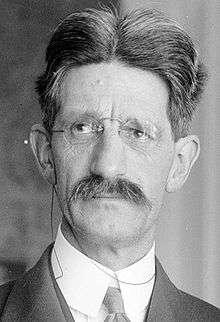Sidney Homer
Sidney Homer, Sr. (9 December 1864 – 10 July 1953) was a classical composer, primarily of songs.
Sidney Homer | |
|---|---|
 | |
| Born | December 9, 1864 Boston, Massachusetts |
| Died | July 10, 1953 (aged 88) |
| Education | Phillips Academy |
| Spouse(s) | |
Biography
Homer was the youngest child born to deaf parents in Boston, Massachusetts on December 9, 1864 (some sources use 1865). He attended the 1884 class of Phillips Academy in Andover, Massachusetts, but did not attend college, although he studied composition with George Whitefield Chadwick and with Josef Rheinberger in Munich.[1] He married contralto Louise Dilworth Beatty in 1895.
Sidney and Louise had six children, including twin daughters Anne Homer and Kathryn Homer, son Sidney Homer, Jr. (economist and author), and daughter Louise Homer.
Sidney Homer died on July 10, 1953 in Winter Park, Florida.
Legacy
Sidney Homer's influence included his mentoring and supporting his nephew, the composer Samuel Barber. Scholarship on Homer was a particular focus of musicologist Harry Colin Thorpe.[2]
Homer composed many of his songs with the voice of his famous wife in mind. Among his most famous songs are "A Banjo Song" (Weeden), "Requiem" (Stevenson), "Casey at the Bat" (Thayer), and "The House that Jack Built" ("Mother Goose.")
Homer's memoir, My Wife and I, was published by Macmillan in 1939 and reprinted by Da Capo Press in 1978.
External links
- Free scores by Sidney Homer at the International Music Score Library Project (IMSLP)
- Sidney Homer page at The Lied and Art Song Texts Page
- Sidney Homer scores (the composer's manuscripts) in the Music Division of The New York Public Library for the Performing Arts
- The Songs of Sidney Homer
- Sheet music for "Plantation Hymn", G. Schirmer, New York, from the Alabama Sheet Music Collection
- Sidney Homer page at Song of America
Notes
- Homer, Sidney (1943). Seventeen Songs by Sidney Homer. New York: G. Schirmer. p. 3.
- See Harry Colin Thorpe, "The Songs of Sidney Homer" in Musical Quarterly, Vol. XVII (1931), pp. 47-73.